The Checker Maven
The World's Most Widely Read Checkers and Draughts Publication
Bob Newell, Editor-in-Chief
Published every Saturday morning in Honolulu, Hawai`i
Noticing missing images? An explanation is here.
Happy Holidays to All

During the winter holiday period, The Checker Maven closes its offices for a week or two, and staff spend time with their families. But that doesn't mean that checkers go off the agenda. Not at all! It's our wont to publish an interesting and entertaining checker problem or two, so our loyal readers can have a little extra checker enjoyment during this festive time of year. And when we look for a special checker problem, we inevitably turn to the master himself, Tom Wiswell; and what better choice than a problem he calls New Year's Resolution. Here's the position.
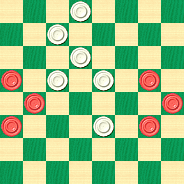
BLACK
Black to Play, What Result?
B:B9,12,13,16,17,20:W10,18,19,23,27,31.
The position comes from a game in a New Year's Day tournament played in New York some decades back. As a holiday present, we'll give you a large hint: Mr. Wiswell, playing Black, won this game.
We would not say that this position is particularly easy, and in fact, it may use up a certain number of your holiday leisure hours. So please enjoy, but don't neglect your family time! When you've found your solution, click on Read More to see the full game, Mr. Wiswell's winning play, and KingsRow's computer analysis.![]()
An Afternoon at Benny's: Newark, 1946
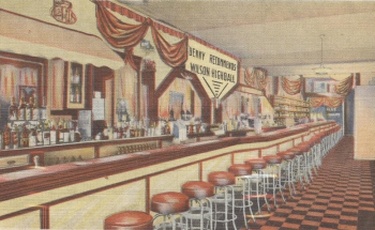
Mid-afternoon on a weekday was usually quiet at Benny's Bar, a long, lazy lull when lunch was over and the factories had not yet let out the crowds of workers seeking a beer or two before taking the streetcar home.
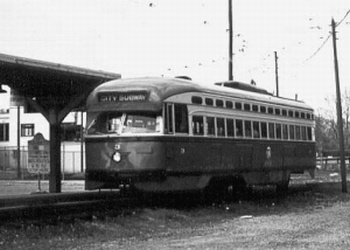
The atomic bombs had fallen on Japan last year; the war was over and times were good in Newark, as the economy returned to a peacetime footing. Though Benny was getting older, and feeling it more each day, he enjoyed running his bar, conversing with his customers, and keeping the place tidy; but above all, Benny enjoyed his checkers. Through the hard times of the '30s, the even darker years of the war, and now into a new era of peace and prosperity, Benny would take on anyone, sitting at his corner table and putting as much as five or ten dollars on the line, winner take all.

Benny sipped his Ballantine's, idly moving the checkers around the board, waiting, as he often did at this time of day, for a customer to come in, and not being in a particular rush for that to happen. He was thinking about an endgame study he had seen in the Roseville Citizen, trying to absorb the play, when the front door of the bar opened and in came a dapper, 40-ish man, dressed neatly in a suit, sporting a trim moustache and slicked-back hair.
“I'm looking for a beer,” the man called. “Anyone here?”
“Back here,” replied Benny from the corner. “You like a Ballantine's on draught? I'll get it for you.”
“Sure, a Ballie's is fine,” said the man, glancing back into the corner from which Benny's voice emanated. “So you're the barkeep...” and just then the man noticed the checkerboard on Benny's table.
“You play?” the man asked Benny. “I'm here in Newark for a few days, and we're between rounds over at the ...”

“I play a little,” Benny replied as he made his way behind the bar and drew a glass of beer from the row of taps along the top of the bar. It was Benny's usual come-on. “Care for a quick game while you drink your beer?”
“Well, sure,” the man replied, “but you ought to know...”
“Couple of bucks on the game?” Benny interrupted. “Just to give things a little more life; this afternoon's been pretty quiet.”
“Well, like I was saying,” the man resumed, “you really should know that....”
“OK, maybe five bucks then? You look like a real sport!”
The man seemed a bit annoyed at Benny's interruptions, and his face took on rather a different look. “How about a sawbuck?” he said in a determined voice. “That would sure liven things up for you if you're bored.”
Benny didn't hesitate. He never did. “Ten bucks it is!” he said. “Come on over to the table. Tell you what. It's nearly an hour 'til the factories let out their first shift and it starts to fill up in here. I'm a sport, too. You go ahead and take the blacks first, and we can play until someone wins.”

“That might not be so long,” the man mumbled, more or less to himself, as he took the glass of beer from Benny and went over to the checkerboard, where Benny joined him after refilling his own glass.
“Ah, the Roseville Citizen,” the man said, noticing Benny's newspaper. “You know I do some writing myself...”
“Yeah,” said Benny, getting impatient to start play, “I'm sure you send a lot of postcards, but how about let's play our game now.”
The man squared his shoulders and simply said, “I tried to warn you; now, have it your way.” And with that, he made his first move and the game began.
There was no further discussion as play went on, the two of them alternately making a move on the board and taking sips of beer from their glasses. Benny was taking his time on each move; his opponent was playing a sharp game, well above the level of play Benny usually encountered. He was secretly wondering if he had made a mistake in taking on this evidently skilled stranger.
The stranger, on the other hand, showed visible impatience, making his own moves rather quickly and with seemingly minimal reflection, as if Benny wasn't a player who needed to be taken very seriously.
The game went on for a good fifty minutes, when Annie, Benny's portly wife and a second bartender during busy hours, came through the back door. “Hey Benny, where are ya?” she said in a loud voice. “We'll be getting busy around here in a few ...”
“Ssh! Quiet hon, I'm in the middle of a tough one here,” Benny said in a vexed tone. “Let us be!” A cross look came over Annie, then she just shrugged her shoulders, put on her apron, and went behind the bar. A couple of factory workers had already made their appearance, expecting to be served their Ballantine's and Shaefer's.

The contestants exchanged a few more moves. Factory workers continued to stream in and some of them started to watch the game. There was surprisingly little banter; somehow, they sensed from Benny that he had a real contest on his hands and didn't want any disturbance or interruption. The stranger made another move. Benny looked at the board, then looked again, a puzzled expression on his face. Some few minutes passed. The dapper, suited man, growing more and more impatient, growled in exasperation, “Will you play already! I haven't got all....”
The man fell silent. He too stared intently at the board, his countenance changing by degrees from unsure to grim. Finally, Benny looked up from the board and said, “You're good, mister, real good, but you shoulda been more careful.” Then, with a surprisingly firm hand, Benny made his move.
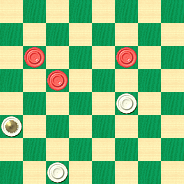
WHITE
White to Play and Win
W:W19,K21,30:B9,11,14.
For the conclusion of our story, the solution to the problem, and story credits, please click on Read More.![]()
A Thanksgiving Feast

We've often said in these columns that Thanksgiving is far and away our favorite holiday. It's distinctly American (and we're unabashed patriots), non-sectarian in celebration (even if not in origin), and a wonderful family event which we greatly enjoy each year.
As a special Thanksgiving treat to accompany your turkey and pumpkin pie, here's a checker problem that we found to be fascinating, in that it has two solutions: one very ordinary and prosaic, and one surprising and snappy. Take a look if you will:
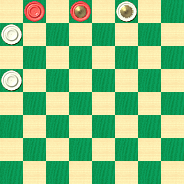
WHITE
White to Play and Win
W:W13,5,K3:BK2,1.
White is a man up and ought to win, but can you find the way that gets you to that second slice of pumpkin pie the fastest? Feast on our problem for a while, then click on Read More for your dessert, in the form of the surprising solution.![]()
A Rush of Cold Air

In our main location here in North America, it's the time of year for those first gusts of really cold air, telling us that we've turned the corner towards winter, and we'll be spending more time indoors in front of the checkerboard. This month, to warm your interest, we have a speed problem that is instructive, interesting, and not all that hard--- if you don't get blown in the wrong direction.
We'll give you twenty seconds to gust through it and find the answer. To begin, just click on the link below to display the problem and start our cold-hearted Javascript clock.
November Speed Problem (fairly easy)
Got it? Click on Read More to breeze over to the solution.![]()
A Friendly Sitting

Our title for today's column comes from a rather old checker magazine, which states that the problem situation shown below came from an informal or "friendly" match played somewhere in Ohio back in the day. Certainly, checkers can be a most sociable pastime, and we would hope that we can all be friends, even given the rather intense competition and rivalries that the game can often engender.
The problem itself, of course, is rather "friendly" in its own right, and we don't think that you'll have a lot of trouble solving it.
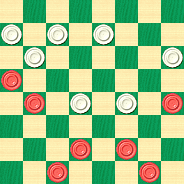
BLACK
Black to Play and Win
B:W28,27,26,24,21,15,14:B20,16,13,7,6,3,1.
Sit down, make friends with the problem, and then click on Read More to see the most agreeable solution.![]()
New PDN Files Available

Thanks to the generosity and hard work of Checker Maven friend John Acker, we have a number of new PDN files available for your instruction and entertainment. Just click on the PDN link in the Downloads section in the right column, or click here.
Don't know about PDN files or how to use them? You'll find an explanatory link on the PDN download page.
Enjoy these new files, and again, thank you John!![]()
Welcoming the New Year

Of course, we're welcoming the New Year on the Jewish calendar --- the year 5769, to be precise, an event celebrated by eating apples dipped in honey and hearing the blowing of the ram's horn, known as the "shofar" and pictured above.
The Checker Maven celebrates by bringing you an interesting (and not very difficult) checker problem in which all is not as it seems, and the obvious may not be obvious at all. Here's our position.
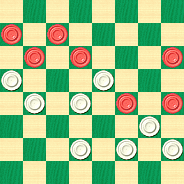
WHITE
White to Play and Win
W:W28,27,26,24,18,17,15,13:B20,19,12,10,9,6,5.
White is a man up, so why are we blowing our horn over this one, you may ask. Well, although the New Year has come quickly upon us as it always seems to do, haste is not advised in making your move here.
See if you can find the win--- as we said, it's not very difficult--- and also demonstrate what's wrong with the "obvious" move. Blow your own horn and then click on Read More for the complete solution. And have a good and a sweet year!![]()
All In A Row

We've chosen our title for today's very interesting problem from its appearance on the checkerboard, with three columns of pieces all in a nice tidy row.
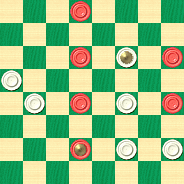
WHITE
White to Play and Draw
W:WK11,13,17,19,27,28:B2,10,12,18,20,K26.
This turns out to be another one of those studies with a lot of options to look at. But there is only one move to draw for White. Can you find it, and demonstrate a draw against any of several possible Black replies? Can you show how other first moves lose for White? This is a position that is full of surprises and exciting checker action. Get your ducks in a row, solve the problem, and then click on Read More for the solution and complete analysis.![]()
Not Too Tough

Like the appetizing dinner pictured above, this month's speed problem is definitely not too tough; in fact, it's rather tender and juicy. So much so, in fact, that we think ten seconds to find the solution is ample time; we rather suspect that most of you will finish it off in half that interval.
When you're ready to feast on this one, click below.
September Speed Problem (easy)
When you've finished the main course, clicking on Read More will bring you dessert--- in the form of our solution, of course.
![]()
Some Good Exercise
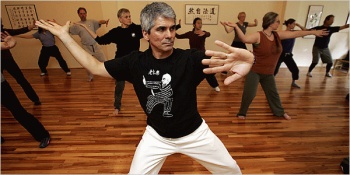
We all know that exercise is good for us, but that few of us do enough of it. What is true for the body, of course, is true for the mind, and today we challenge you to do some checker exercise. (We're tempted to call it "checkersize" but perhaps that's just a little over the edge.)
First take a look at the position below; it's one of those odd "White to Play, Black to Win" sort of things.
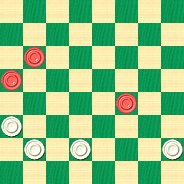
WHITE
White to Play, Black to Win
W:W28,26,25,21:B19,13,9.
What do you make of this? The exercise we invite you to try is to think about the possible White moves, Black replies, and ensuing lines of play. What gives White the best chances? How are those chances foiled by Black? Spend a little time on this and stretch your checker muscles; your technique and skill is bound to benefit. Then exercise your mouse finger by clicking on Read More to see our idea of the solution.![]()
The Checker Maven is produced at editorial offices in Honolulu, Hawai`i, as a completely non-commercial public service from which no income is obtained or sought. Original material is Copyright © 2004-2026 Avi Gobbler Publishing. Other material is public domain, AI generated, as attributed, or licensed under CC1, CC2, CC3 or CC4. Information presented on this site is offered as-is, at no cost, and bears no express or implied warranty as to accuracy or usability. You agree that you use such information entirely at your own risk. No liabilities of any kind under any legal theory whatsoever are accepted. The Checker Maven is dedicated to the memory of Mr. Bob Newell, Sr.

